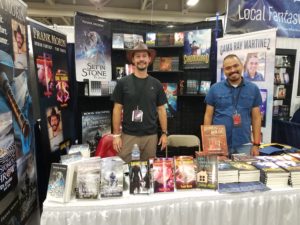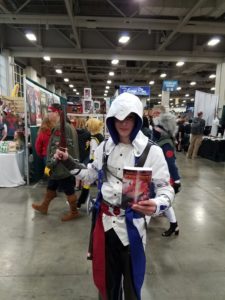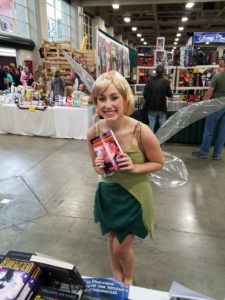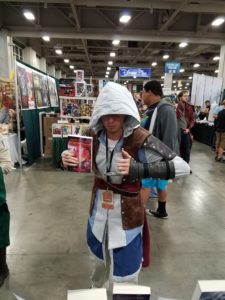There are times during NaNoWriMo where one has to become mobile. This does not mean you’re off the hook for your daily goal! It means you need to adapt, improvise, and overcome. Here’s a couple of suggestions to help you.
Phone Apps and Thingies
- There are several apps that you can use to translate voice to text. On my iPhone, I use Nuance’s Dragon Dictate, the free version. It works great and the price is right.
- You can use Siri or the Android assistant to text or email yourself.
- There are plenty of third party apps you can discover, both free and paid. Make sure you read the reviews and watch when it was last updated.
- You can always record your voice and play it back to transcribe when you’re done driving for the day.
- Make sure you bring along your headphones with a microphone. They tend to record better than the built-in microphone.
- I would recommend you get a foldable keyboard that allows you to type normally with your cell phone. It plugs in like a piece of paper in a typewriter, and the bonus is some of them allow you to charge the phone as you write your NaNo story.
Laptop(s)
I normally bring along a Samsung Chromebook when I go to conventions. Chromebooks are lightweight and have excellent battery life. While it would seriously suck if someone were to walk off with your hardware, I’d rather lose a Chromebook that synced to the cloud (my cost was $160 a few years ago) versus losing my writing laptop (HP G650, $400 + $100 in maxing out the memory) or, heavens forbid, my main graphics laptop (Toshiba gaming beast, $1200 with RAID drives). You can also use an inexpensive Android tablet. I have a couple that cost me less than fifty bucks each.
The McDonald’s Mantra
I worked at a McDonalds back when I was 18 years old. I was more interested in dating the manager than doing actual work, but the folks who were there for a long while had a saying: “Time enough to lean, time enough to clean.”
Considering I was a lazy lout, that stuck with me over the years. Now I adapt it to writing, where if you have more than fifteen minutes of spare time you can get some words down. Use your laptop, Chromebook, tablet, phone, or a handy pen and paper. As Depeche Mode says, everything counts in large amounts.
If I’m waiting for a panel to start, I’m usually actively puzzling out a section of one of my in-work projects. If I have an hour until the next panel, I whip out my Chromebook and start typing. I learned this from author Kevin J. Anderson at a convention in Colorado. Whenever he had some downtime, he was quietly tucked away in some corner working on a novel. It was a good lesson — writers should be writing.
I’m scheduled to appear at Windycon 44 in the Chicago area tomorrow through the 12th of November. You can rest assured that I’ll be working on my projects, but please make sure to stop and say hello. Writing is important, but so is life and interaction. Tonya L. De Marco will be there with me, so you’ll probably be more interested in meeting her.
On November 17th and 18th, Tonya L. De Marco and I will be appearing at The Cosplay Convention and Anime Experience in Little Rock, Arkansas. We hope to see you there!
What are your suggestions for writing while traveling?







